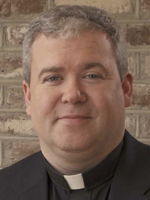At times in our lives the demands of discipleship can lead us to feel alone or awkward in the midst of our family, our group of friends, or among our co-workers.
It can be a difficult experience. I think of today’s young people, who at times feel the pressure to reject or compromise their discipleship for acceptance or some other social pressure. They want to be good disciples, but they also want to have friends.
As disciples, are we meant to be social outcasts? Is this a necessary aspect? Are we expected to follow God and walk alone?
Certainly, as disciples, there are times when we might seem peculiar to those around us because of our faith, worldview, or moral convictions. In spite of these situations, however, our discipleship is not meant to be at odds with the social needs of our human nature. Our discipleship is for community, and it calls us to foster a social identity and community life.
Our social nature can be complemented by and find expression in discipleship. Our assent to God, and to realities beyond this world, lead us to see the common thread among all people. We feel the real challenge to love beyond ourselves, and to see the dignity of each person.
Our discipleship helps create a real foundation and guarantee for ordered and peaceful community life. It demonstrates our common human nature and emphasizes our shared social fabric. Discipleship summons us to see the good in each person. Through our discipleship, each of us is delivered from our own self-centeredness and isolation.
We are able to see that life is not governed by what we lay down as principles and by what we consider important, but by communal principles of goodness and holiness.
We are each reminded that we are called to live in community, and that we have human rights because we have human duties.
Our responsibility to dialogue, exchange ideas, share civil discourse, experience conversion and change of thought are highlighted and encouraged. In these encounters, personal development and growth are expected and inspired. Human creativity and the capacity to love find avenues in which they can flourish.
Our discipleship is about community. It nurtures a dynamic way of life, and allows us to see each other as brothers and sisters.
Father Kirby is the parochial vicar at St. Mary Help of Christians Church in Aiken.

